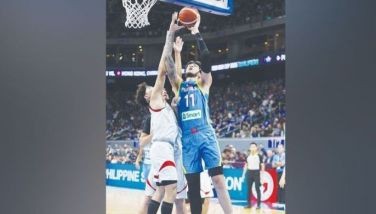Four factions of the MNLF reunite
January 23, 2003 | 12:00am
CAMP SIONGCO, Maguindanao — Four factions of the Moro National Liberation Front (MNLF) have reunited, raising speculations on whether jailed former Autonomous Region in Muslim Mindanao (ARMM) governor Nur Misuari could reassume the group’s chairmanship.
Cotabato City Mayor Muslimin Sema, who belongs to the biggest faction regarded as the MNLF’s mainstream group, has confirmed the reunification which was brokered by the government of Libya, a member of the influential Organization of Islamic Conference (OIC).
The OIC helped broker the Sept. 2, 1996 peace agreement between the government and the MNLF, which had waged a three-decade secessionist war in the South.
Sema said the leaders of the four MNLF factions signed a declaration of unity during what he described was an "emotion-filled gathering" at the University of the Philippines in Diliman, Quezon City last Jan. 20.
The declaration, he said, would bind all factions together under one banner and one organizational framework.
Among those who drafted the document were ARMM Assemblyman Hatimil Hassan, who represented the MNLF’s Sema wing; former ARMM Speaker Isnaji Alvarez of the Isnaji group; Habib Mujahab Hashim of the Islamic Command Council; and Alim Murshi Ibrahim of the so-called "Misuari loyalist" faction.
"Our main focus now is the rewriting of the MNLF charter to (make it) attuned to present-day political realities and the dimensions of our direct involvement in peace-building in Mindanao," Sema told The STAR.
It was Sema’s group, whose members include all of the MNLF’s 16 state chairmen, Sulu Gov. Yusoph Jikiri and Marawi City Mayor Solitario Omar, that declared Misuari as chairman emeritus and took control of the MNLF leadership two years ago due to loss of trust and confidence in Misuari’s leadership.
The Islamic Command Council, on the other hand, is led by more radical MNLF leaders who bolted in the late 80s due to irreconcilable differences with Misuari.
It was implicated in the Abu Sayyaf raid on Ipil, Zamboanga del Sur in 1995, which left some 70 people dead and dozens more injured.
The Misuari loyalists, led by the members of his Cabinet when he was still ARMM governor, have maintained their loyalty to him despite charges of corruption and mismanagement of the MNLF.
Dozens of Misuari’s followers were killed when they staged a revolt on Nov. 19, 2001 in Jolo, Sulu to dramatize their opposition to the holding of regional elections on Nov. 26 that same year. Malacañang-anointed physician Parouk Hussin, who also belongs to the MNLF, was subsequently elected governor.
The foiled mutiny led to Misuari’s detention and prosecution on rebellion charges. He is locked up at a special detention facility in Sto. Rosa, Laguna.
According to Sema, the "interim, composite leadership" of the reunified MNLF factions have agreed to initiate extensive consultations, even with MNLF communities in far-flung areas, this year to discuss the setting up of the front’s new chain of leadership.
Sema said they still respect Misuari as their founding chairman and recognizes his role in building linkages with OIC member-countries and in forging the 1996 peace agreement with the government.
"This reunification (does not put us in) war-footing, but (is) just a major stride for us to have one voice and one direction in furthering the government-MNLF peace pact and in upholding its gains," he said.
In a press statement, Hussin said the reunification of all MNLF factions augurs well for the efforts of President Arroyo in promoting unity among Mindanao’s fragmented Moro communities.
"It is easier for us to attain peace and sustainable development in our communities if we have a common vision of peace and development," he said.
Hussin said leaders of the four MNLF factions agreed to "bury their hatchets" and work together in improving the implementation of the 1996 peace accord.
"The (reconciliation) gathering, made possible through the efforts of Libyan Ambassador Salem Adam, was a very important chapter in the history of the MNLF for it provided a venue where all of the fragmented (groups) of the front reconciled their differences," he said.
Adem said the Libyan government is bringing at least 150 MNLF leaders representing the four factions to Tripoli next month to "uphold the reconciliation" and resolve the leadership issue.
He said President Arroyo and Presidential Assistant on the Peace Process Eduardo Ermita have been informed about the Tripoli meeting.
Adem said a meeting between the MNLF and the Moro Islamic Liberation Front (MILF) will be subsequently called to unify the two groups.
He said Libya also supports the resumption of peace negotiations of the MILF with the government.
President Arroyo told reporters here the other night that she is hopeful that peace agreements could be forged with the MILF — and the National Democratic Front too — during her presidency.
The Cabinet Oversight Committee is reviewing the drafts of proposed peace accords with the MILF and the NDF, which will later presented to President Arroyo for approval.
"We hope to finish them soon so that the peace negotiations could continue," Defense Secretary Angelo Reyes said.
Cotabato City Mayor Muslimin Sema, who belongs to the biggest faction regarded as the MNLF’s mainstream group, has confirmed the reunification which was brokered by the government of Libya, a member of the influential Organization of Islamic Conference (OIC).
The OIC helped broker the Sept. 2, 1996 peace agreement between the government and the MNLF, which had waged a three-decade secessionist war in the South.
Sema said the leaders of the four MNLF factions signed a declaration of unity during what he described was an "emotion-filled gathering" at the University of the Philippines in Diliman, Quezon City last Jan. 20.
The declaration, he said, would bind all factions together under one banner and one organizational framework.
Among those who drafted the document were ARMM Assemblyman Hatimil Hassan, who represented the MNLF’s Sema wing; former ARMM Speaker Isnaji Alvarez of the Isnaji group; Habib Mujahab Hashim of the Islamic Command Council; and Alim Murshi Ibrahim of the so-called "Misuari loyalist" faction.
"Our main focus now is the rewriting of the MNLF charter to (make it) attuned to present-day political realities and the dimensions of our direct involvement in peace-building in Mindanao," Sema told The STAR.
It was Sema’s group, whose members include all of the MNLF’s 16 state chairmen, Sulu Gov. Yusoph Jikiri and Marawi City Mayor Solitario Omar, that declared Misuari as chairman emeritus and took control of the MNLF leadership two years ago due to loss of trust and confidence in Misuari’s leadership.
The Islamic Command Council, on the other hand, is led by more radical MNLF leaders who bolted in the late 80s due to irreconcilable differences with Misuari.
It was implicated in the Abu Sayyaf raid on Ipil, Zamboanga del Sur in 1995, which left some 70 people dead and dozens more injured.
The Misuari loyalists, led by the members of his Cabinet when he was still ARMM governor, have maintained their loyalty to him despite charges of corruption and mismanagement of the MNLF.
Dozens of Misuari’s followers were killed when they staged a revolt on Nov. 19, 2001 in Jolo, Sulu to dramatize their opposition to the holding of regional elections on Nov. 26 that same year. Malacañang-anointed physician Parouk Hussin, who also belongs to the MNLF, was subsequently elected governor.
The foiled mutiny led to Misuari’s detention and prosecution on rebellion charges. He is locked up at a special detention facility in Sto. Rosa, Laguna.
According to Sema, the "interim, composite leadership" of the reunified MNLF factions have agreed to initiate extensive consultations, even with MNLF communities in far-flung areas, this year to discuss the setting up of the front’s new chain of leadership.
Sema said they still respect Misuari as their founding chairman and recognizes his role in building linkages with OIC member-countries and in forging the 1996 peace agreement with the government.
"This reunification (does not put us in) war-footing, but (is) just a major stride for us to have one voice and one direction in furthering the government-MNLF peace pact and in upholding its gains," he said.
In a press statement, Hussin said the reunification of all MNLF factions augurs well for the efforts of President Arroyo in promoting unity among Mindanao’s fragmented Moro communities.
"It is easier for us to attain peace and sustainable development in our communities if we have a common vision of peace and development," he said.
Hussin said leaders of the four MNLF factions agreed to "bury their hatchets" and work together in improving the implementation of the 1996 peace accord.
"The (reconciliation) gathering, made possible through the efforts of Libyan Ambassador Salem Adam, was a very important chapter in the history of the MNLF for it provided a venue where all of the fragmented (groups) of the front reconciled their differences," he said.
Adem said the Libyan government is bringing at least 150 MNLF leaders representing the four factions to Tripoli next month to "uphold the reconciliation" and resolve the leadership issue.
He said President Arroyo and Presidential Assistant on the Peace Process Eduardo Ermita have been informed about the Tripoli meeting.
Adem said a meeting between the MNLF and the Moro Islamic Liberation Front (MILF) will be subsequently called to unify the two groups.
He said Libya also supports the resumption of peace negotiations of the MILF with the government.
President Arroyo told reporters here the other night that she is hopeful that peace agreements could be forged with the MILF — and the National Democratic Front too — during her presidency.
The Cabinet Oversight Committee is reviewing the drafts of proposed peace accords with the MILF and the NDF, which will later presented to President Arroyo for approval.
"We hope to finish them soon so that the peace negotiations could continue," Defense Secretary Angelo Reyes said.
BrandSpace Articles
<
>
- Latest
- Trending
Trending
Latest
Trending
Latest
Recommended



























